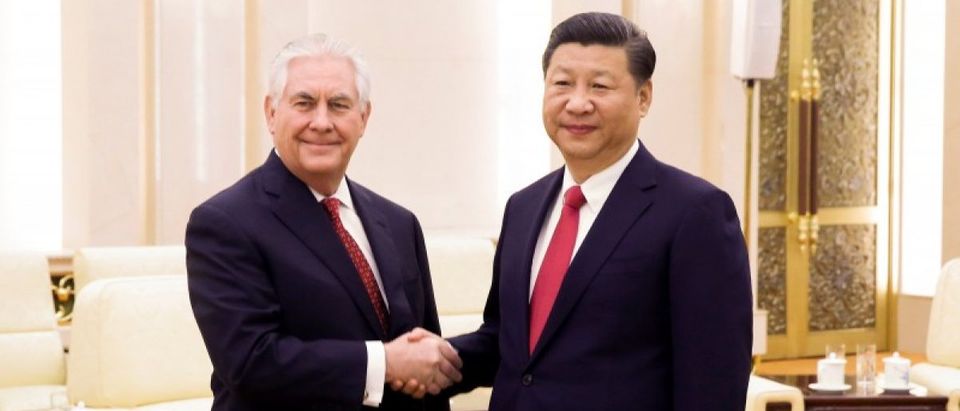Secretary of State Rex Tillerson made his first official trip to Beijing this past weekend, and during his visit, he may have handed China a “diplomatic victory.”
For years, China has been pushing a new framework for U.S.-China bilateral relations known as the “new model of major-country relations.” While the previous U.S. administration, despite some early mishaps, approached the proposal cautiously, Tillerson appears to have openly accepted China’s proposal, possibly without even realizing it.
The “new model of major country-relations,” as Chinese President Xi Jinping first defined it during his 2013 meeting with former President Barack Obama in Sunnylands, California, emphasizes no conflict or confrontation, mutual respect for each country’s national interests, and win-win cooperation.
China continued to promote its “new model of major-country relations” throughout the previous administration.
“China is ready to work with the United States to make efforts in a number of priority areas and putting into effect such principles as non-confrontation, non-conflict, mutual respect, and win-win cooperation. And with unwavering spirit and unremitting efforts, we will promote new progress in building a new type model of major-country relations between the two countries so as to bring greater benefits to our two peoples and two countries,” the Chinese president said in Beijing in 2014.
During his trip to Beijing, Tillerson repeated the tenets of China’s proposal for a new framework of bilateral ties.
The relationship between the U.S. and China “has been a very positive relationship built on non-confrontation, no conflict, mutual respect, and always searching for win-win solutions,” Tillerson said Saturday during his meeting with Chinese Foreign Minister Wang Yi. When he met Xi Sunday, the Chinese president told Tillerson that “the two countries should also enhance coordination on regional hotspot issues, respect each other’s core interests and major concerns and encourage friendly exchanges between the two peoples,” and Tillerson reportedly agreed, according to the Xinhua News Agency.
The phrase “mutual respect” is the most troubling to critics, as China appears to be referring to respect for its “core interests,” which range from Taiwan and Tibet to the unresolved territorial disputes in the East China Sea and South China Sea.
“The US-China relationship is too complicated to be encapsulated by a single label and doing so can lead to misunderstanding and potential miscalculation,” Bonnie Glaser, senior adviser for Asia and the director of the China Power Project at the Center for Strategic and International Studies, told the Daily Caller News Foundation. “China’s definition of ‘new model of major country relations’ includes respect for Chinese core interests, but China has never clearly defined either what ‘respect’ means or what its ‘core interests’ include. China has also not made clear what core U.S. interests it is willing to respect.”
Agreeing to a constructive relationship “is good enough for both countries to do business,” she added, suggesting that a broader label is unnecessary.
Ely Ratner, a senior fellow at the Council on Foreign Relations, called Tillerson’s wording “a big mistake and a missed opportunity” and criticized him for repeating Chinese government “platitudes and propaganda.”
“China’s characterization of the U.S.-China relationship, as exemplified by those phrases, portends U.S. decline and accommodation,” Ratner told the Washington Post, adding, “Tillerson using these phrases buys into this dangerous narrative, which will only encourage Chinese assertiveness and raise doubts in the region about the future of U.S. commitment and leadership in Asia.”
Chinese foreign policy experts said the secretary of state’s comments came as a surprise.
“China has long been advocating this, but the United States has been reluctant to accept the point of ‘mutual respect’,” Jin Canrong, foreign relations expert at Renmin University of China in Beijing, told Post reporters. “Tillerson’s comment will be very warmly welcomed by China.”
There is the possibility that Tillerson’s rhetoric is a response to Chinese concessions behind closed doors, perhaps on issues pertaining to North Korea or trade. It is unclear whether Tillerson fell into a diplomatic trap or walked in willingly in exchange for other concessions in important areas of interest to the U.S.
Send tips to ryan@
All content created by the Daily Caller News Foundation, an independent and nonpartisan newswire service, is available without charge to any legitimate news publisher that can provide a large audience. All republished articles must include our logo, our reporter’s byline and their DCNF affiliation. For any questions about our guidelines or partnering with us, please contact licensing@dailycallernewsfoundation.org.












